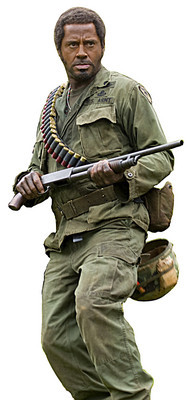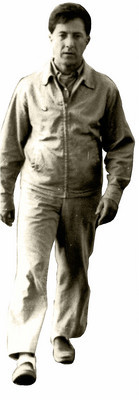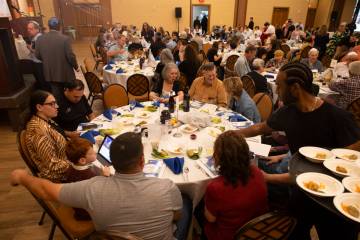Language packs a punch in culture
Francisco Menendez recently told some colleagues that he had caught a showing of "Tropic Thunder," the Ben Stiller-Robert Downey Jr. summer hit that last weekend remained the No. 1 movie in the country.
"And somebody said, 'Oh, you saw it in a place where there were no pickets?' " said Menendez, chairman of the University of Nevada, Las Vegas' film department.
Menendez suspected picketers might be upset that Downey plays nearly the entire film in blackface. But, he recalled, "they said, 'No, it was about the disabilities.' "
During the movie, and in service to a key plot point, the word "retard" and its variations are used liberally. That has prompted criticism from disability rights groups and, in some cities, protests outside theaters showing the movie.
Although the medium (a comedy) and the focal point (a word that isn't a racial slur) may be a bit out of the ordinary, the film has reignited American culture's continuing debate about what can, or should, be said and done in the name of art.
The scene at issue in "Tropic Thunder" is a conversation between actors about how to win awards by playing mentally challenged characters. Downey's character advises Stiller's that Oscar voters prefer only partially challenged characters, and that playing "full retard" never wins awards.
Boycotts of the film have not occurred in Las Vegas, but several moviegoers who saw it last week at Galaxy Theatres at the Cannery had no problem with the scene.
"It's just real slapstick" and typical Hollywood comedic fodder, said Jim Chilton of Florida, who was in town visiting his daughter.
"That's just Hollywood," he said. "It's a movie, and if it offends you, then don't go to it."
"The controversy didn't offend me personally," said Jevon Yeretzian, 26, who saw the film with his brother, Shahe, 23.
But, said Jevon -- who's stationed in Korea with the Air Force and was in Las Vegas to visit Shahe -- "I can definitely see how it could offend others."
Linda Smith hasn't seen the movie. But Smith, chief development officer of Opportunity Village and the mother of a son with Down syndrome, is not sure the use of "retard" or variations of it are ever warranted.
Media portrayals of the disabled can be powerful, said Smith, who considers 1988's "Rain Man" a "landmark movie on a lot of different levels, because you saw that this (character) was profoundly disabled, yet you loved this character."
Smith saw that movie with her son. And, while leaving the theater with Chris, "people were turning around and smiling at him and looking at him and accepting him," she said. "That's vivid in my memory."
And if she and Chris were to see "Tropic Thunder"? "I don't know that there would be the same reaction," Smith said.
Given the movie's use of a word employed solely as a mean-spirited epithet, Smith isn't sure she'd want to see "Tropic Thunder" herself, even though "I don't know I'd be one of those outside boycotting it."
Nell Minow, who writes "Movie Mom," a column on Beliefnet.com in which she evaluates movies from a parent's perspective, argues that protesters' ire is misdirected.
"Tropic Thunder" doesn't lampoon the disabled, Minow said during a recent phone interview, but, rather, the self-absorption of Hollywood and actors who offer one-dimensional portrayals of the disabled and then congratulate themselves for it.
"As a person with disabled family members and whose first job was working with what we then called the 'retarded,' I've been appalled at movies that get all kinds of critical praise, like 'I Am Sam' and 'Forrest Gump,' because I think they're terrible portrayals of disabled characters," Minow said.
"Too often in movies, the disabled aspect is the character's defining trait," Minow continued, and disabled characters exist only to "inspire people and/or give (other characters) an important lesson about compassion. That's about it, and this is wrong. Disabled people are interesting human beings who've got really interesting stories to tell."
In "Tropic Thunder," the word "retard" is used to "show something about the person who said it," Minow said, and the film makes "a very trenchant and powerful argument in favor of the disabled being treated well by showing that the person who didn't understand was a nincompoop."
Similarly, even as Downey plays a white actor who darkens his skin to play a black character, the film is "very intelligent in giving the actual black character the power and moral weight in the movie," Minow said.
Crossing or at least dancing perilously close to the line of social acceptability isn't anything new, artistically speaking. Comedy, in particular, "has always poked fun at sacred cows," Menendez said. "That's one of its functions in society."
But effective comedy and satire also require that the audience consider a film "in its entire context," he continued, and not make a judgment simply on the basis of having seen a YouTube snippet or a trailer.
Words do have meaning, Minow said. "But we cannot let words be divorced from their context. That creates an inhibition in our frank discussion."
In a way, the "Tropic Thunder" debate mirrors the debate about whether racial slurs should ever be used in art, be it hip-hop, TV, movies or such acknowledged classics of literature as Mark Twain's "The Adventures of Huckleberry Finn."
Rainier Spencer, director of the Afro-American studies program at UNLV, doesn't favor racial slurs in any usage. But, he said, one consideration in judging whether to use them is to ask if "there is an artistic purpose to it."
That could take the form of a "documentary angle," he said, in which a film may depict somebody using a word because the character actually does or would. Or, Spencer said, it could take the form of using the word in the service of "lampooning" a larger issue.
Still, the reality is that somebody somewhere probably will be offended by just about anything. Jaq Greenspon, a master's in fine arts degree candidate and English composition instructor at UNLV, once sold a script for the TV series "Star Trek: The Next Generation" that was a takeoff of Stephen King's novel "Misery."
"The idea of the story was that somebody was an ardent follower of Picard and kidnapped him and wanted him, basically, to tell him about his exploits," Greenspon said. "What we were doing in fairly clear terms is, we were mocking the obsessed 'Star Trek' fan. In fact, that was why they bought the episode. Originally, they said, 'That's brilliant.' "
But, Greenspon continued, "the next producer said, 'We can't make fun of our fans.' "
So, Greenspon said, the script was rewritten.
Studios and artists often can be afraid of offending people, Greenspon said. And, on the other side of the artistic equation, audiences often can be "so quick to be offended that we don't actually look at the message. And there's the problem: As soon as you take something out of context -- as can be seen in any political ad of the last 25 years -- it's very easy to become offended by it."
Actually, Menendez joked, given "Tropic Thunder" and its deft evisceration of Hollywood and the actors who inhabit it, "I'm surprised actors aren't picketing the film."
Contact reporter John Przybys at jprzybys@reviewjournal.com or 702-383-0280.





























